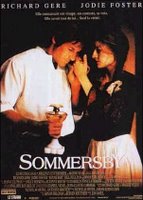
Sommersby (1993)
Starring: Richard Gere, Jodi Foster, Bill Pullman
Written by: Nicholas Meyer and Sarah Kernochan
Directed by: Jon Amiel
Official Website (IMDB)
(Photo: movie poster courtesy of IMDB.com)
Caution: A few little spoilers are in this review.
After my embittered former post on Valentine's Day, I feel I should talk about some real romance. Last weekend I had a DVD marathon as the Nor'eastah (as the locals say) gave us all here in Boston a good pounding. While working my way through my collection until the wee hours of the morning, I came upon Sommersby- a period gem I hadn't seen in a while. I curled up by the heater with some hot cocoa and a wooly blanket and popped it in with ecstasy.
Based on the French film The Return of Martin Guerre, Sommersby centers on a tiny Southern town and the return of the village's patriarch, Jack Sommersby six years after the end of the Civil War. He returns to an exuberant, but war-ravaged town, and his dubious wife Laurel who is none too pleased to see him. The man claiming to be Sommersby looks and sounds as he should, but his new kind and generous nature eventually casts suspicion on him and the life that he and Laurel have built together. When Sommersby is arrested for murder, he must choose between life (and death) as Jack Sommersby or admitting who he really is.
Believe me, there's some hot stuff going down under the humid Southern sun- Gere and Foster are amazing as usual, both as individuals and with each other. Bill Pullman, who I can usually only see as the President from Independence Day is actually quite fiendishly good as Laurel's jilted lover Oran. And James Earl Jones takes a cameo as a (gasp!) African-American judge, with his Darth Vader voice and fabulous delivery. It's classically filmed, which means lots of wide shots of hills and valleys, church steeples and people in wagons. It makes for a comfortable movie, rich and enthralling to watch.
The movie's a tad superficial in some ways, especially when attempting to deal with the complex issues of Reconstruction, race relations and the birth of the Klan. The problem with this kind of historical fiction is that the primary plot line is a love story completely detached from world or nation events. Then these events are diluted and simplified, and thrown in the mix almost as an after-thought. The one exception is Sommersby's scheme to grow tobacco in the fields and sell portions of his land to anyone who can pay- no matter what color their skin is. As the townspeople debate this, they are revealed as a cross-section of most of the South- happy to be alive, but broke, war-weary, unemployed and caught in a world that is strange and unfamiliar. They want to keep to the old ways, but they are beginning to realize that it's impossible.
But as I said, this is primarily a love story, and a good one at that. Both Gere and Foster specialize in sultry, longing gazes, and grand declarations of love. The courtroom scene where Sommersby must prove his identity (and by doing so, cementing his guilt), is especially swoon-worthy in the best, most Hollywood-like manner. Jack puts Laurel on the stand who claims that he is not her husband. He berates her, asking her repeatedly how she knows, until finally, spent, she cries out, "I know because I never loved him the way that I love you!"
Oh Lord, I do believe I'm going' to faint.

No comments:
Post a Comment